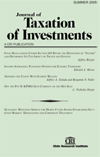Tax Planning for Offshore Hedge Funds—the Potential Benefits of Investing in a PFIC
Author: Philip S. Gross.
Source: Volume 21, Number 02, Winter 2004 , pp.187-195(9)

< previous article |next article > |return to table of contents
Abstract:
U.S. investors are often confronted with the issue of investing in an offshore investment vehicle and hedge fund managers are often confronted with the issue of whether to set up a domestic fund, an offshore fund or both. Generally, U.S. tax-exempt investors and foreign investors invest in a manager’s parallel offshore hedge fund or offshore feeder fund which is classified as a corporation for U.S. federal income tax purposes. Conventional wisdom is that U.S. taxable investors invest in the manager’s parallel domestic fund or domestic feeder fund which is classified as a partnership for U.S. federal income tax purposes. But conventional wisdom is not always wise. This article discusses the tax issues that a U.S. investor should consider when investing in an offshore fund (and as a corollary what a hedge fund manager should consider when structuring his or her funds) with a particular focus on the various PFIC (i.e., passive foreign investment company) elections potentially available to a U.S. investor and highlights the potential affirmative tax benefits, although somewhat counterintuitive, of U.S. investors investing in offshore funds rather than in domestic funds.Keywords:
Affiliations:
1: Kleinberg, Kaplan, Wolff & Cohen, PC.